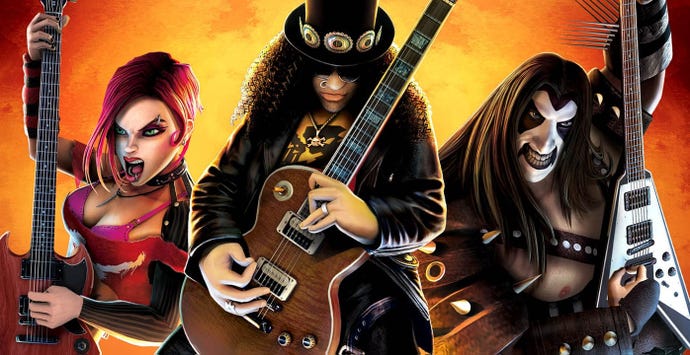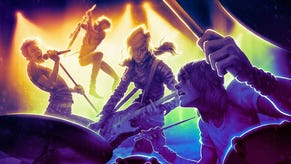With new Tony Hawk and Guitar Hero, is Activision ushering back a golden era of games?
Guitar Hero. Tony Hawk. Is Activision leading us back to the good old days, the bad old days - or into the future?
When Activision speaks, people listen, and when Activision shows its hand, people rush to peer at the cards. This year, for some reason, all those cards point to the resurrection of a vibe we haven't felt in years.
A bunch of old games we'd written off are back on the radar all of a sudden. Most notably in the last few weeks, Tony Hawk's new game leaked a bit, and Activision yesterday announced a new Guitar Hero.
Both franchises were flogged to death and expected never to return, but here we are, just as if it were PS2 o'clock all over again. Has the world gone mad?
No. The excitement these two new titles have generated among the faithful is not to be under-estimated, and both were compelling enough experiences that a whole new audience - the all-important masses, as opposed to the tiny core who spend their days posting comments about how they'll never buy a new music game - is likely to want to have a look.
Moreover, Activision doesn't make decisions like these based on whims. Activision is such an enormous presence that it's easy to forget it only publishes a small number of titles each year. Apart from Sierra, its new digital label, it has almost exclusively doubled down on blockbusters (Call of Duty, Skylanders, Destiny) and a small number of licenses (Marvel, Transformers).
It's also easy to forget that it takes enormous risks, and almost always succeeds; while Destiny may have seemed like safe bet thanks to its feature list and pedigree, investing half a billion dollars in anything is a huge gamble in a market that has become very unfriendly to new IP. If it had gone t*ts up, Activision would have had a hell of a time getting back on keel.
It didn't go t*ts up because Activision nurtured it as carefully as it knows how. That includes, yes, throwing massive amounts of money at marketing, and if the rumours are to be believed, requesting a significant rejig of the project to make it possibly less bold but probably more successful.
It did this because it's a savvy company run by savvy people. It's easy to armchair general the games industry and accuse publishers of being out of touch with what people want, but Activision regularly sells 30 million copies of Call of Duty, so clearly it's got a line on that.
Does this approach promote the industry as an artistic medium? Is it a consumer-first approach? Probably not. Is it making a lot of money producing games people really want to play and shoring up our oh-so-fragile industry? Yes. Demonstrably so. Thank goodness.
So when Activision speaks, people listen, and when Activision shows its hand, people rush to peer at the cards. This year, for some reason, all those cards point to the resurrection of a vibe we haven't felt in years.
"We may get back some of the games that were beaten to death by franchise fatigue back before anybody really understood what a danger that was."
This is an unsurprising development in some ways; the last generation was so drawn out, and saw mainstream triple-A game releases reduced to such a tiny trickle of hits, that many of us are near prostrate with nostalgia for the ridiculously prolific release schedules of a bygone era, when weird and wonderful things were happening in mainstream publishing all the time. Nostalgia, fuelled by long years of dully identical mainstream releases while genres like RPG and adventure were neglected, is a powerful driving force.
Thanks in part to this nostalgia, as well as very modern longing for diversity in genre and aesthetic, indie and crowdfunded development is taking over the market that once belonged to mid-tier games, which were largely squeezed out by breathtakingly expensive production and marketing costs. But while we may never see the return of the days when dozens of publishers shat out hundreds of worthwhile games every quarter, we may get back some of the games that were beaten to death by franchise fatigue back before anybody really understood what a danger that was, and every game had to turn a zillion dollar profit to succeed.
Franchise fatigue is often thrown around as evidence that bringing back Guitar Hero, Tony Hawk and the like is insanity. But Activision, as I've already said, is a cunning creature. If it thinks the stigma of plastic peripherals, overpriced DLC and painfully rapid release turn arounds weighs less with the mass market than nostalgia and the inherent merits of games like Tony Hawk and Guitar Hero, then it's probably right. If it thinks it can make a shareholder-pleasing profit outside the blockbuster shooter and toys-to-life genres, it's probably right.
What's really exciting to me about these new releases is that other developers and publishers are likely to feel the time is right to resurrect their own old favourites, or splash out into riskier genres and aesthetics. We've already seen Harmonix get back on the Rock Band wagon (the contrast between Harmonix and Activision's approach to the phoenix-like genre is an interesting topic in and of itself). What other properties and genres, left to sink quietly into the obscurity of consumers' goldfish memories, might be resurrected? What new ideas are ready for a good push into the mainstream?
Activision has the chops and resources to back projects considered too risky for mainstream release over the past few years. I keep thinking of it like some enormous, slow-but-steady creature, plodding through the snow. Agile, lightweight indies have been flitting in this direction for years, but now the great beast has turned, and is following along. As it passes, it tramples a path for all the medium sized animals that follow behind.
The return of shuttered franchises is a sign that the financial crunch is ending, and publishers can afford to spread out a little from the hit-driven business, to back smaller-margin projects. We may not be on our way back to the dripping excess of a decade ago, but now that the industry is climbing back out of the GFC pit, I suspect we're going to see many more neglected properties, developers and concepts surfacing in mainstream games. I'm especially interested to see how Activision handles its Sierra label, on the off-chance that small and medium-tier development can also make a comeback; certainly Ubisoft is giving that a go.
We'll never enjoy another time like the PS2 era, when money flowed like floodwater and publishers threw energy and resources at a ridiculously diverse and numerous collection of projects. Modern console development is simply too expensive for that. But it looks like we might see the return of some of the classics of that time, now that belts are loosening again after the crunch, and I for one am not sorry to see that happen.
The images in this article show the extravagance of Activision's E3 2010 party, which reportedly cost $10 million.








